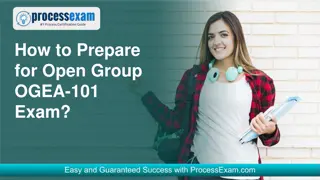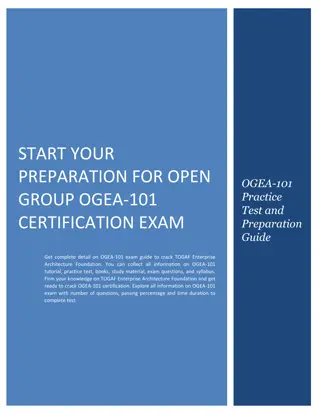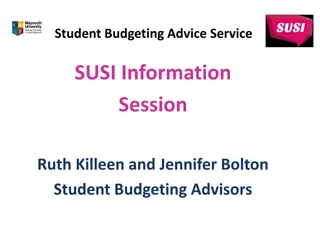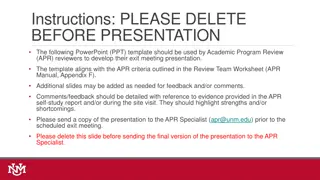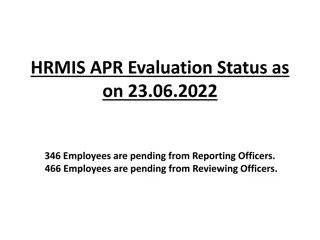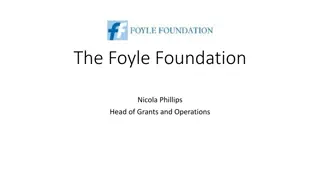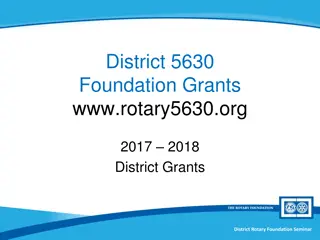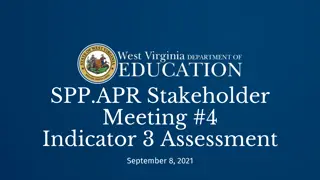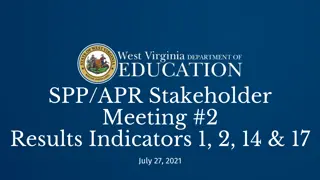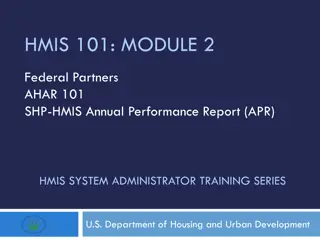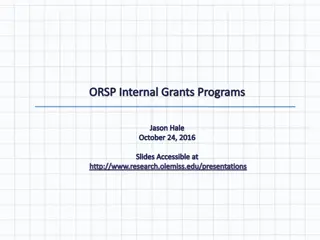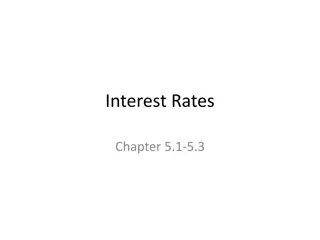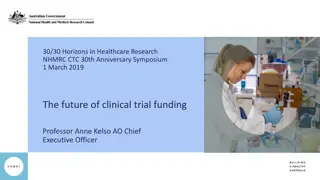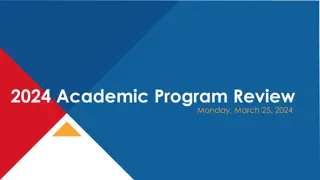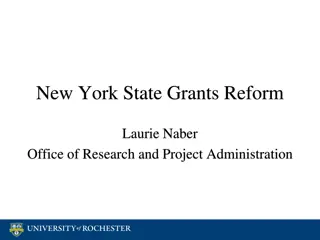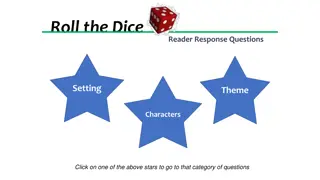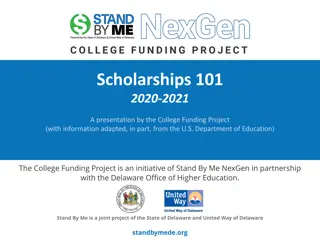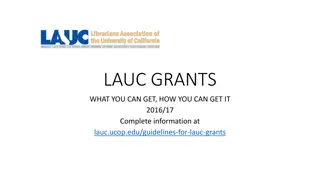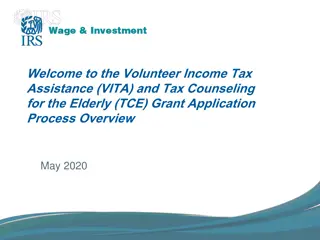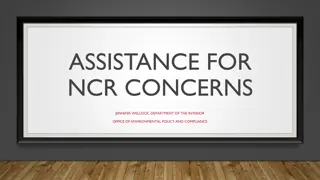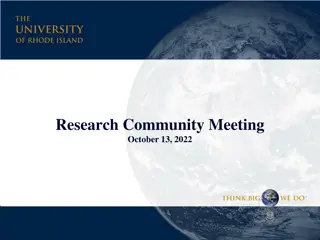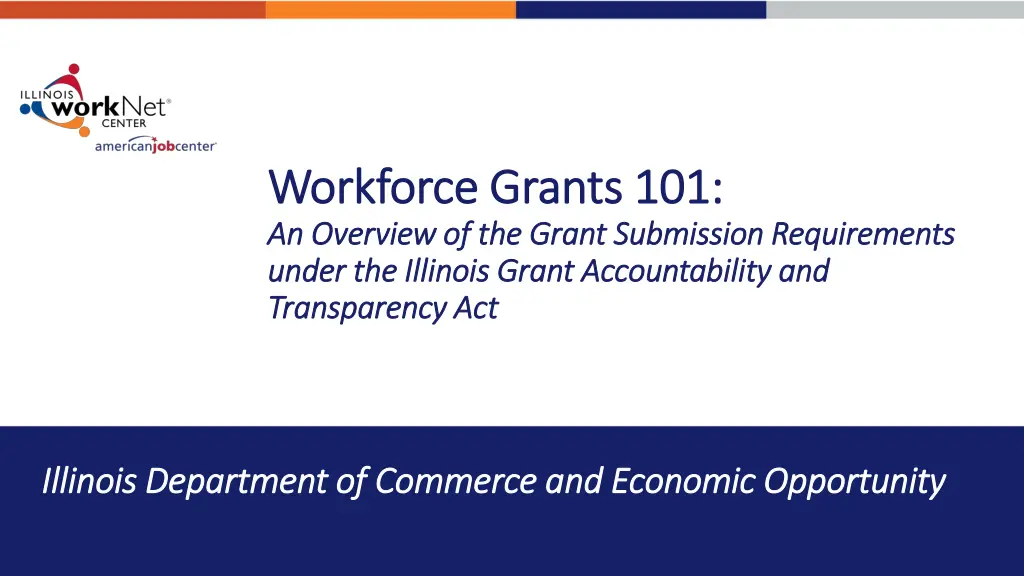
Grant Submission Requirements in Illinois
Discover the essential grant submission requirements under the Illinois Grant Accountability and Transparency Act, including pre-award, award, and post-award stages. Learn about the Grant Life Cycle and the significance of the Grant Accountability and Transparency Act in ensuring accountability and reducing administrative burdens for both State agencies and grantees.
Download Presentation

Please find below an Image/Link to download the presentation.
The content on the website is provided AS IS for your information and personal use only. It may not be sold, licensed, or shared on other websites without obtaining consent from the author. If you encounter any issues during the download, it is possible that the publisher has removed the file from their server.
You are allowed to download the files provided on this website for personal or commercial use, subject to the condition that they are used lawfully. All files are the property of their respective owners.
The content on the website is provided AS IS for your information and personal use only. It may not be sold, licensed, or shared on other websites without obtaining consent from the author.
E N D
Presentation Transcript
Workforce Grants 101: Workforce Grants 101: An Overview of the Grant Submission Requirements An Overview of the Grant Submission Requirements under the Illinois Grant Accountability and under the Illinois Grant Accountability and Transparency Act Transparency Act Illinois Department of Commerce and Economic Opportunity Illinois Department of Commerce and Economic Opportunity
Grant Life Cycle Grant Life Cycle This presentation will focus on the pre-award requirements of a workforce grant from the Illinois Department of Commerce and Economic Opportunity. Pre-Award Award Post- Award
Illinois Grant Accountability and Illinois Grant Accountability and Transparency Act Transparency Act The Grant Accountability and Transparency Act (GATA), 30 ILCS 708/1 et seq., is a State of Illinois law to: Increase accountability and transparency in the use of grant funds Reduce the administrative burden on both State agencies and grantees Adoption of the federal grant guidance and regulations codified at 2 CFR Part 200 (Uniform Requirements)
Grantee Pre Grantee Pre- -Award Requirements Award Requirements that must be Completed Prior to that must be Completed Prior to Grant Award Execution Grant Award Execution Grantee Registration Grantee Pre-Qualification Financial and Administrative Risk Assessment (ICQ Internal Control Questionnaire) Programmatic Risk Assessment Mandatory Disclosures & Conflict of Interest Documents
GATA & Indirect Cost Rate System GATA & Indirect Cost Rate System Office of Management and Budget GATA Website: http://grants.illinois.gov Grantee Links Tab is the entry point for the GATA portal Authentication, Registration, Pre-qualification, Fiscal & Administrative Risk Assessment Centralized Indirect Cost Rate System will be used to elect the indirect cost rate option and, if necessary, complete the indirect cost rate negotiation process. Grantees that are not current users in the system will receive an invitation to the Centralized Indirect Cost Rate System once a Notice of State Award (NOSA) is generated by a State awarding agency
Grantee Registration Grantee Registration All Grantees must be registered with the State of Illinois using the Illinois.gov Authentication Portal. A personal or business email address is required to establish an account Grantee Registration is completed by browsing to https://grants.illinois.gov/portal and associating your Illinois.gov account with your organization. Completing the registration process triggers Grantee pre-qualification verifications
Grantee Pre Grantee Pre- -Qualification Qualification Pre-Qualification includes verification of: Valid DUNS number Current SAM.gov account Good Standing with Secretary of State Not on Federal Excluded Parties List Not on the Illinois Stop Payment List Not on the DHFS Provider Sanction List *Pre-qualification is dynamic and verifications are completed nightly.
Pre Pre- -Qualification Notification Qualification Notification If there are no issues, the GATA portal will send email to communicate Qualified status. If there are issues, the GATA portal emails qualification issue(s) DUNS number is not current SAM CAGE Code is not current Not in Good Standing with Secretary of State On the Federal Excluded Parties List (cannot be remediated)
GATA Framework for Risk GATA Framework for Risk Assessment Assessment Fiscal Risk Assessment (ICQ) is automated. The Grantee can access the ICQ from the grantee portal. The ICQ is completed on an annually basis by the Grantee The ICQ should be completed at the entity-wide level All state agencies will utilize the results of the ICQ Programmatic Risk Assessment will be conducted by the awarding agency (DCEO) in the application process. It is unique to each NOFO and grant program and is typically completed if the proposal is recommended for funding. Risk profiles will be determined based on the two risk assessments. Risk profile will determine grant specific conditions and monitoring.
Indirect Cost Rate Selection Indirect Cost Rate Selection Centralized Indirect Cost System Centralized Indirect Cost System All grantees must select an Indirect Cost Rate option in a centralized indirect cost rate system. An indirect cost rate is a device used for determining the appropriate amount of indirect costs each program should bear. An Indirect Cost Rate is the ratio between the total indirect expenses and some direct cost base. Options available for a Grantee to receive an Indirect Cost Rate: Current Federal negotiated Indirect Cost Rate Agreement Negotiate a rate with the State of Illinois Elect to use the Federal 10% de minimis rate of Modified Total Direct Cost (MTDC) Elect to decline any indirect cost rate
Indirect Cost Rate Proposals & Elections Indirect Cost Rate Proposals & Elections Centralized Indirect Cost System can be accessed at http://grants.illinois.gov from the dropdown menu in the Grantee Links Tab. This site includes: FAQs Training Modules Forms and Indirect Cost Rate Templates Department of Labor Indirect Cost Rate Guide An indirect cost proposal or rate election must be initiated with the Centralized Indirect Cost Rate system upon notice of award. The indirect cost rate proposal or rate election must be completed no later than three (3) months after the effective date of the State award. Uniform Guidance (2 CFR 200) requires an annual submission of an indirect cost proposal or rate election. The Centralized Indirect Cost Rate system will be used for annual renewals. Annual submissions must be received within six months after the Grantee s fiscal year end.
Who is Required to use the Who is Required to use the Centralized Indirect Cost Rate System Centralized Indirect Cost Rate System Any organization that receives a grant from a State of Illinois grant making agency. If a grantee organization has a federally negotiated rate, they are required to provide information through the indirect cost rate system. If a grantee organization chooses to elect the 10% de minimis rate, they are required to make this election in the indirect cost rate system. A grantee may volunteer to accept a lower indirect cost rate, but state agencies are not allowed to force or coerce a grantee to take a lower rate
Standard Application & Standard Application & Grant Award Documents Grant Award Documents Notice of Funding Opportunity (NOFO) Catalog of State Financial Assistance https://www.illinois.gov/sites/GATA/Grants/SitePages/CSFA.aspx Uniform Application for State Grant Assistance Uniform Budget Template Notice of State Award
Uniform Application for State Grant Uniform Application for State Grant Assistance Assistance Agency Information Funding Opportunity Information Instructions on How to Submit an Application Required Grant Information Applicant Completed Section Applicant Information Contact Information Key Project Information (Location, Term, Amount) Fiscal Information Certification
Uniform Budget Template Uniform Budget Template - - Overview Overview Uniform Budget Template for most State of Illinois Grants (modeled after the SF-524 Federal Budget template). Basic Budget Line Item Definitions based on the Uniform Administrative Guidelines [Develop Budget Line Items Sheet]. General Requirements Allowable Reasonable Allocable
Allowable Costs Allowable Costs 200.403 200.403 Factors affecting allowability of costs: Be necessary and reasonable for the performance of the Federal award and be allocable under the Federal Cost Principles. Conform to any limitations or exclusions set forth in these principles or in the Federal award as to types or amount of cost items. Be consistent with policies and procedures that apply uniformly to both federally-financed and other activities of the non-Federal entity. Be accorded consistent treatment. A cost may not be assigned to a Federal award as a direct cost if any other cost incurred for the same purpose in like circumstances has been allocated to the Federal award as an indirect cost. Be determined in accordance with generally accepted accounting principles (GAAP), except, for state and local governments and Indian tribes only, as otherwise provided for in this Part. Not be included as a cost or used to meet cost sharing or matching requirements of any other federally financed program in either the current or a prior period. Be adequately documented.
Reasonable Costs Reasonable Costs 200.404 200.404 A cost is reasonable if, in its nature and amount, it does not exceed that which would be incurred by a prudent person under the circumstances prevailing at the time the decision was made to incur the cost. The question of reasonableness is particularly important when the non- Federal entity is predominantly federally-funded. In determining reasonableness of a given cost, consideration must be given to: Whether the cost is of a type generally recognized as ordinary and necessary for the operation of the non- Federal entity or the proper and efficient performance of the Federal award. The restraints or requirements imposed by such factors as: sound business practices; arm s-length bargaining; Federal, state and other laws and regulations; and terms and conditions of the Federal award. Market prices for comparable goods or services for the geographic area. Whether the individuals concerned acted with prudence in the circumstances considering their responsibilities to the non-Federal entity, its employees, where applicable its students or membership, the public at large, and the Federal government. Whether the non-Federal entity significantly deviates from its established practices and policies regarding the incurrence of costs, which may unjustifiably increase the Federal award s cost.
Allocable Costs Allocable Costs 200.405 200.405 A cost is allocable to a particular Federal award or other cost objective if the goods or services involved are chargeable or assignable to that Federal award or cost objective in accordance with relative benefits received. This standard is met if the cost: Is incurred specifically for the Federal award; Benefits both the Federal award and other work of the non-Federal entity and can be distributed in proportions that may be approximated using reasonable methods; and Is necessary to the overall operation of the non-Federal entity and is assignable in part to the Federal award in accordance with the principles in this subpart. All activities which benefit from the non-Federal entity s indirect (F&A) cost, including unallowable activities and donated services by the non-Federal entity or third parties, will receive an appropriate allocation of indirect costs.
Type of Costs Type of Costs Administration Program Direct Indirect Direct Indirect See: http://www.illinoisworknet.com/WIOA/Documents/SMART_Module3.pdf for more information.
Types of Costs Types of Costs Direct costs: Costs that can be identified specifically with a particular final cost objective, such as a Federal award, or other internally or externally funded activity, or that can be directly assigned to such activities relatively easily with a high degree of accuracy. 200.413 Indirect Costs (Facilities and Administration): Costs incurred for a common or joint purpose benefitting more than one cost objective, and not readily assignable to the cost objectives specifically benefitted, without effort disproportionate to the results achieved. 200.456
Uniform Budget Template Outline Uniform Budget Template Outline Instructions Section A Grant Funds Summary Indirect Cost Rate Information Section B Match Cash In-Kind Leverage Certification FFATA Data Collection Section C Budget Worksheet & Narrative
Uniform Budget Template Section A: Uniform Budget Template Section A: State of Illinois Funds State of Illinois Funds Includes funding that is provided by the state awarding agency regardless if the grant is state or Federally funded (federal pass- through funds). The standard budget line item definitions are consistent with the Uniform Administrative Guidance. The line items that are not applicable to the grant program are grayed out . The Uniform Budget Template provides a space for Program-Specific line items.
Section A: Indirect Cost Selection Section A: Indirect Cost Selection All grantees must complete the Indirect Cost Rate Form and select one of the following options: Use the current Federally approved indirect cost rate as a result of being a direct grant recipient from a Federal awarding agency; Negotiate a rate with the State of Illinois by first submitting an Indirect Cost Rate Proposal to the State of Illinois Centralized Indirect Cost Unit; Use the Federal de minimis rate of 10% of modified total direct costs (MTDC); Use a Restricted Rate designated by programmatic or statutory policy; Choose not to request reimbursement of indirect costs.
Section B: Non Section B: Non- -State of Illinois Funds: Matching Funds Funds: Matching Funds State of Illinois For all Federal awards, any shared costs or matching funds and all contributions, including cash and third party in-kind contributions, must be accepted as part of the non- Federal entity s cost sharing or matching when such contributions meet all of the following criteria: Are verifiable from the non- Federal entity s records; Are not included as contributions for any other Federal award; Are necessary and reasonable for accomplishment of project or program objectives; Are allowable under Subpart E Cost Principles of this Part; Are not paid by the Federal government under another Federal award, except where the Federal statute authorizing a program specifically provides that Federal funds made available for such program can be applied to matching or cost sharing requirements of other Federal programs; Are provided for in the approved budget when required by the Federal awarding agency; and Conform to other provisions of this Part, as applicable.
Uniform Grant Agreement Uniform Grant Agreement - - Part I Part I Article I Award and Grantee Specific Information Article II Required Representations Article III Definitions Article IV Payment Article V Scope of Grant Activities/Purpose of Grant Article VI Budget Article VII Allowable Costs Article VIII Required Certifications Article IX Criminal Disclosure Article X Unlawful Discrimination Article XI Lobbying
Uniform Grant Agreement Uniform Grant Agreement Part I Part I Article XII Maintenance and Accessibility of Records; Monitoring Article XIII Financial Reporting Requirements Article XIV Performance Reporting Requirements Article XV Audit Requirement Article XVI Termination; Suspension Article XVII Subcontracts/Sub-Grants Article XVIII Notice of Change Article XIX Structural Reorganization Article XX Agreements with other State Agencies Article XXI Conflict of Interest Article XXII Equipment or Property Article XXIII Promotional Materials; Prior Notification Article XXIV Insurance Article XXV Lawsuits Article XXVI Miscellaneous
Uniform Grant Agreement Uniform Grant Agreement Part I Part I Exhibit A Project Description Exhibit B Deliverables or Milestones Exhibit C Payment Exhibit D Contact Information Exhibit E Performance Measures Exhibit F Performance Standard Exhibit G Specific Conditions
Uniform Grant Agreement Uniform Grant Agreement PART 2 Grantor Specific Terms PART 3 Project Specific Terms
Grantee Resources Grantee Resources https://www.grants.Illinois.gov http://www.illinoisworknet.com/GATA https://www.illinoisworknet.com/wioastateplan https://www.doleta.gov/grants/UniformGuidance.cfm http://etasmarttraining.com/pdf/Single_Track_Region1.pdf https://www.workforcegps.org/ http://www.naswa.org/ https://www.doleta.gov/
For More Information Contact For More Information Contact For More Information Contact Charles Dooley Charles.Dooley@Illinois.gov John Barr John.W.Barr@Illinois.gov John Barr John.W.Barr@Illinois.gov Matthew Hillen Matthew.Hillen@Illinois.gov

